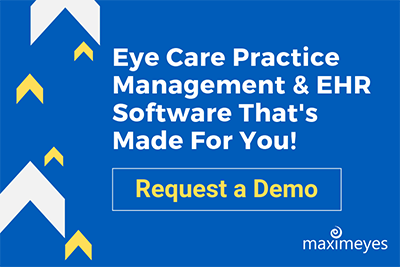
27 Sep Achieve High ROI with Cloud-Based Optometry & Ophthalmology EHR
You are not alone if you have doubts about using a cloud-based EHR system. The decision to embrace optometry and ophthalmology EHR software is more than just technology; it’s an investment in the future and success of your practice.
Many eye care offices struggle daily with billing complications, patient communication issues, and local server failures. All of these issues contribute to one common problem—wasted time.
Inefficiencies create office chaos. Chaos negatively affects patients and your financial budget. The migration to cloud technology is a widespread trend focusing on efficiency, security, and savings.
Below are several ROI (return on investment) benefits of using a cloud-based EHR and practice management system, such as MaximEyes.com, to help you overcome challenges and improve efficiency and productivity.
Reduce Data Risks Through a Cloud-Based EHR System
Data protection is your primary concern when migrating your EHR system to the cloud. As an eye care professional, you know the critical importance of data protection better than anyone.
A recent report from IBM shows a healthcare data breach in the U.S. costs an average of $11 million in 2023. The question is: What is the best way to avoid this massive liability?
A cloud-based, HIPAA-compliant EHR system is undoubtedly a step in the right direction. When deciding on a solution, ask your EHR vendor these questions about certifications and security to ensure all your data protection bases are covered. For instance:
- Does the vendor encrypt protected data while at rest?
- Is multi-factor authentication used?
- What authentication tools are used to get into the EHR system?
- What measures protect data from theft, loss, and hacking?
“MaximEyes.com always emphasizes secure data protection and disaster recovery and pays close attention to staying on top of security and privacy issues. For example, two-factor authentication adds a second layer of security to verify your identity when accessing MaximEyes.com.” –Dr. Brad Bodkin
Rest Easy with Secure Backup and Disaster Recovery

In the cloud, you have more peace of mind. Did you know that according to Enterprise Apps Today, 75% of small businesses do not have a disaster recovery plan? If you look closer at the ROI advantages of using a cloud-based EHR system, a significant area of savings lies in the data backup cost.
Consider These Benefits and Savings
- A data backup service might charge your practice $4,800 annually to back up your data nightly. This cost vanishes when you migrate your EHR software to the cloud.
- EHR software updates and patches happen automatically in the cloud, eliminating time-consuming manual processes and daily practices that put your system and data at risk.
- Cloud-based software saves all your information and data regardless of unforeseen or natural disasters. As a result, you have more robust security, automatic backup, and easier recovery.
Related: 6 Cybersecurity Tips to Protect Your Eye Care Practice
Celebrate Substantial Savings on IT and Hardware Costs
Moving your EHR system to the cloud is easy to use and maintain regardless of your technical expertise. Say goodbye to IT roadblocks.
Consider These Benefits and Savings
- When your EHR system is in the cloud, there are no servers to install, maintain, or back up your EHR data. A server typically needs to be replaced every few years.
- You may have an IT consultant on retainer for around $1,000 monthly. Or, you could pay someone internally to manage everything. Eliminate or reduce these costs when you move your system to the cloud.
Enjoy Greater Accessibility and Improve Connectivity
With cloud-based ophthalmology and optometry EHR software, you will have better remote access from most mobile devices, PCs, and Macs. Everything is at your fingertips: scheduling, billing, medical history forms and records, and patient communication. Time is money, and these efficiencies will save you both.
Technology is always a huge investment; you must know it is worth it. Not only will you improve efficiencies in your practice and provide even better patient care, but you’ll also save long-term.
“Using a cloud-based EHR allows us to work remotely anywhere and anytime, from any device using the Google Chrome™ web browser, and our data is protected in the Microsoft® Azure cloud. Moving to MaximEyes.com, we no longer need to install, maintain, or back up our patient data—MaximEyes.com does it all on a secure cloud-based system.” –Dr. Peter Falk
Quickly Scale Cloud Storage Up or Down
When your practice grows, you need more cloud storage to support that growth. Scalability in cloud storage offers a dynamic solution that mirrors the evolving needs of your eye care practice.
Like managing your smartphone’s storage, a cloud system proactively notifies you when approaching your storage limits.
Consider These Benefits and Savings
- MaximEyes.com makes adding more space to store your data easy and affordable. If you need to reduce your data storage due to factors like staff changes or location adjustments, the process is equally hassle-free.
- This ability to scale up or down as needed provides your eye care practice flexibility that traditional hardware-based solutions simply can’t match. It’s a testament to the adaptability and efficiency that cloud-based EHR systems bring to your practice, ensuring you’re always right-sized for your operating requirements.
Lessen Energy Costs and Environmental Footprint
Servers use energy—an additional cost for your optometry practice. With cloud-based EHR software, there are no additional energy costs. Cloud data centers are more energy efficient and more environmentally sustainable.
By transitioning to the cloud, you save on your business operating expenses and contribute to a greener, more eco-friendly future. This aligns with the broader trend in healthcare towards sustainability and responsible resource management.
“I recommend that eye care professionals consider moving to a cloud-based EHR and practice management system sooner rather than later and before you accumulate too much paper! We spent considerable time storing, scanning, and then shredding old paper charts. And choose a company that focuses exclusively on the eye care industry.” –Dr. Chet Myers
MaximEyes.com: Embrace the Cloud with Undeniable ROI Benefits
Transitioning to a cloud-based EHR system for your optometry or ophthalmology practice is a step forward and a leap toward efficiency, security, and cost savings. Certified EHR software like MaximEyes.com prioritizes cloud data protection by adhering to strict, secure cloud data protection, backup, and disaster recovery.
We’re ready to share the many ROI benefits you will experience with MaximEyes.com’s all-in-one solution. Request more information today or schedule a quick introductory phone call with one of our representatives.





